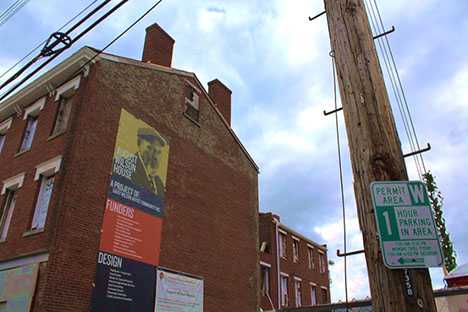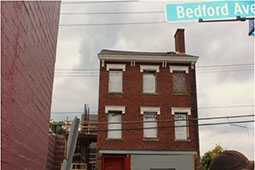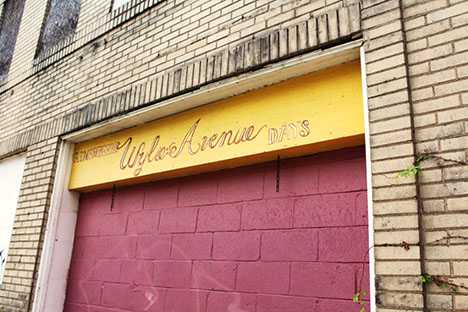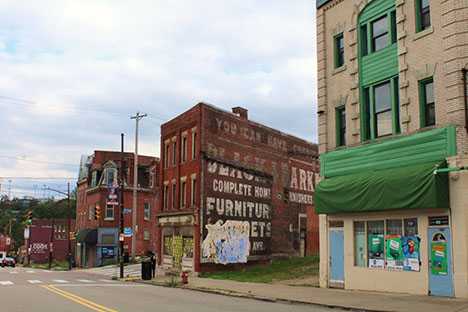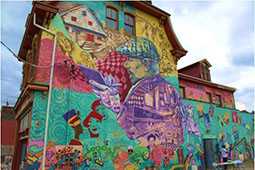Secret Pittsburgh
Community Renaissance: August Wilson’s Living Legacy
By Ryann Nieberle
Decades after demolition left the “middle heart” of the Hill District a “burned out” ghost of the once-flourishing neighborhood, a home on Bedford Avenue stands as an optimistic glimpse into the future (Whitaker 312). The existing narrative surrounding the Hill District is one of tragedy, stemming from the racial and socioeconomic identity of the neighborhood situated between Oakland and Downtown Pittsburgh. But, within the historically slighted community lies the childhood home that survived to tell the tale of one of the Hill’s greatest success stories. The overwhelming significance of the August Wilson House stands twofold, as both a continuation of an artist’s incredible legacy and as a resource to foster the next generation of Hill success stories.
Widely revered as one of the greatest American playwrights, August Wilson brought his childhood in Pittsburgh to life on Broadway and left a significant impact on the residents of his home on the Hill. He succeeded in completing the American Century Cycle, a series of ten interconnected plays set in ten different decades, nine of which won Tony Awards. After his passing in 2005, Wilson’s success continued, with two Netflix adaptations of his works and an astounding cultural impact on his home community. His stories depict the struggle of succeeding in the Hill District over many decades and tell a larger story of Black existence in Pittsburgh. The personal experiences that shaped his writing led many residents of the neighborhood to feel an even stronger connection to his works. Given Wilson’s success story, the August Wilson House stands as a valued tribute to a Hill native making an incredible name for himself from difficult circumstances. The future of the space coincides with a complicated history of African American culture in the neighborhood, and the struggle for its survival.
In modern days, the Hill District is often looked down upon, as a sort of downtrodden valley between Oakland and Downtown Pittsburgh. The aftermath of a federally sanctioned urban redevelopment effort of the 1950s and 1960s left the neighborhood uprooted, overcrowded, and underfunded. However, from the 1930s to 1950s, the Hill District existed as a booming mecca for African Americans arriving with the Great Migration (“Film”). In 1945, August Wilson was born into this thriving neighborhood, full of life, culture, and prosperity. His childhood home, the August Wilson House on Bedford Avenue, exemplified the ethnographic mix of the neighborhood at the time. The house sat behind a Jewish Market, beside an Italian repair shop, and neighboring families both Black and white (Whitaker 305). The film Wylie Avenue Days reflects upon this period of Black excellence and examines the features of the neighborhood that appealed to those resettling in the Migration (“Film”). Though decades have passed, signs of the flourishing past linger, as if the neighborhood longs for a revitalization of what used to be.
Years later, the Urban Redevelopment Authority’s disruption and destruction of the Hill District forced Wilson and his family to leave their home on Bedford Avenue for Hazelwood. There, he faced a large amount of racially charged bullying in schools, causing him to bounce from one school to another, before dropping out altogether. Throughout his sporadic schooling, Wilson took an interest in writing and poetry, though he received little support from his teachers. One resource he did heavily utilize, however, was the Carnegie Library of Hazelwood, where he read a variety of African American works and became enticed with the idea of “the Negro’s power of hard work” (Whitaker 309). Historically, Africans used the power of oral storytelling to hold onto their history and cultural identity. In telling these narratives, “The information passed orally becomes part of the community’s possessions and part of its strength” (Wilson). Drawing on this inspiration, Wilson began to write poetry, and eventually plays, growing into the great playwright he is remembered as today.
Wilson moved out of the Steel City as a young adult, though he continued to produce works full of Pittsburgh, with characters that lived and breathed as he did during his childhood on the Hill. In telling his stories, he really wrote a piece of himself into each character in his plays. For example, in Two Trains Running, a play noted for being especially relevant due to the Hill District setting, Sterling closely resembles Wilson, as a young man trying to make his way amidst the struggles of the Urban Renewal Project. In his other works, Wilson drew from more of his life experiences to craft settings throughout the rest of the city. Residents of the Hill can resonate with his works, not just in physical setting, but in the narrative of Black power which Wilson gave voice to. Additionally, the extraordinary story of Wilson’s successful rise from Hill poverty to national renown is one that serves as an inspiration to those still residing in the neighborhood. By simply walking the streets of the Hill District, visitors can appreciate the high regard in which Wilson is held in his childhood hometown, memorialized in murals and other tributes.
However, as for the August Wilson House itself, Wilson was clear in his intention to create a “useful” space and not a memorial. The house does stand as a site for the celebration of “the literary and personal legacy of August Wilson,” but more so as a space for scholars and artists of a new generation to have the resources to grow and succeed (August Wilson House). Part of what makes Wilson’s success story so impressive is that he did so from the direst of circumstances, with very little resources or advocates for his success. However, Wilson believed that the power of hard work “without the cultural tools to assess its value” cannot “contribute to [the] growth and survival of Africans in America” (Wilson). Therefore, the transformation of the August Wilson House will act as one such tool to nurture individual success of youth on the Hill and advance the larger “art and culture of the African Diaspora” in Pittsburgh (August Wilson House). In addition to providing a space for creative expression, the foundation also hopes to provide resources in the form of artists’ housing and youth fellowships to further invest in the success of the community (August Wilson House). Through the preservation of Wilson’s home, the August Wilson House Foundation hopes to use the spirit of the famed writer’s legacy to provide the essential resources for community growth.
The August Wilson House is currently in the final stages of renovation and hopes to open to the pubic in Spring of 2022 (August Wilson House). Even throughout the renovation process, the foundation has made progress in achieving the goals of fostering community within the Hill, through a series of block parties, backyard theater productions, and programs aimed to gather community engagement (August Wilson House). Once completed, the space will effectively honor the past, highlighting the home’s interior as lived by Wilson, and encourage the future advancements of individual creativity in his community. The future of the site holds much promise as an opportunity for the restoration of “August Wilson’s Pittsburgh,” where Black arts and culture will once again thrive. The house, along with Wilson’s legacy, will work to further shape the community identity and revitalize one of the nation’s most vibrant Black neighborhoods. To visit the house and invest in Wilson’s legacy is to invest in the future of the Hill and the spirit of its residents. The stories of the Black community in Pittsburgh have been stifled by decades of oppression and destruction, but “out of the historical rubble” beautiful works of art are fighting to emerge (Wilson).
Works Cited
August Wilson House, http://augustwilsonhouse.org.
“August Wilson: The Ground on Which I Stand ~ August Wilson's 10-Play Cycle: Scenes and Synopses.” PBS, Public Broadcasting Service, 23 Dec. 2020, https://www.pbs.org/wnet/americanmasters/august-wilson-the-ground-on-which-i-stand-scenes-and-synposes-of-august-wilsons-10-play-cycle/3701/.
“Film Screening and Discussion of Wylie Avenue Days.” National Archives, 26 Mar. 2019, https://www.archives.gov/calendar/event/film-screening-and-discussion-of-wylie-avenue-days. Accessed 29 Nov. 2021.
Whitaker, Mark. Smoketown: The Untold Story of the Other Great Black Renaissance. Simon & Schuster Paperbacks, 2019.
Wilson, August. “An OpEd Column by August Wilson: Feed Your Mind, the Rest Will Follow.” Pittsburgh Post-Gazette, 28 Mar. 1999.
